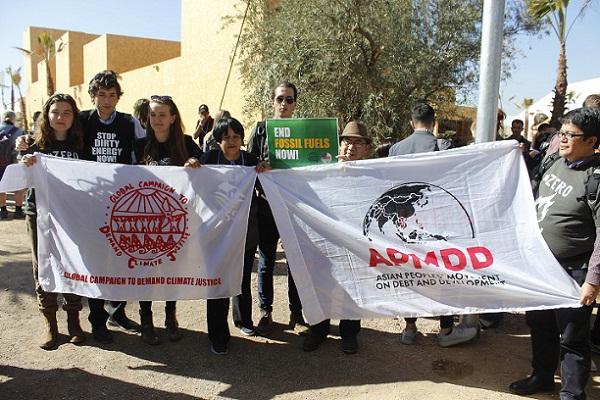
From Saidul Khan
MARRAKECH (MOROCCO), NOV 14: Civil societies from across the globe on Monday converged at UN conference on climate change COP22 to demand world leaders halt all fossil fuel extraction and make an urgent just transition to a clean energy future.
A coalition of over 375 non-governmental organizations delivered a letter to global leaders with an urgent demand for climate action: no new fossil fuel development.
Experts say that post Paris, the reductions needed to reach the goal of limiting warming to 1.5 degrees Celsius and countries’ pledged reductions remains unjustifiably wide.
Scientists say the agreement’s pollution-cutting pledges leave the planet on track for 3 degrees Celsius temperature rise, which could inflict catastrophic damage on vulnerable communities and ecosystems.
The need for urgent action to prevent average global warming was demonstrated as organisations pitched for transition to 100 per cent renewable energy.
Experts said that COP22 must reinforce Paris Agreement goal and the need for enhanced action as a matter of survival for vulnerable countries.
“Limiting global warming to 1.5°C is a matter of equity and essential to contain harmful climate impacts and allow countries and communities to thrive in resilience. When celebrating the Paris Agreement at COP22, government leaders must commit to take more action and ramp up finance for poorer countries”, said Sven Harmeling, Climate Change Advocacy Coordinator of CARE International.
Experts say that the only way to achieve the Paris Agreement commitments is to keep the world’s remaining fossil fuels in the ground.
A report released here said recent Oil Change International study found that just the reserves in currently operating gas- and oilfields alone — even without coal — would take the planet dangerously beyond 1.5 degrees Celsius of warming.
“Muslim countries and communities must take climate action at the local and global level to implement their faith teaching by transitioning from fossil-fuel based to clean energy based development. It is crucial to build strong coordination and collaboration between Muslim nations, and to accelerate the increase of renewable into their national energy-mix in order to ensure justice in achieving the 1.5°C temperature limit”, said Nana Firman, Co-coordinator of the Global Muslim Climate Network (GMCN).
Oil Change International shows that operating coal, oil and gas projects contain enough carbon pollution to push the planet beyond the red lines of warming laid down in Paris and has made an urgent call for renewable energy.
Executive Director Climate Action Network (CAN) Wael Hmaidan said, “In light of the current political climate hovering over the climate talks, I think it is now more urgent than ever to move forward with our common 100% renewable energy agenda”.
Experts further say that governments must now put their Paris pledges into action — and action means no more room for new fossil fuel projects.
At COP22 India has projected to the world about its ambitious solar power and renewable projects and commitment to become 100 per cent electric vehicle nation by 2030.
The impressive renewable project at Tamil Nadu on completion will become world’s second largest and one of the world’s largest onshore wind farm. India’s commitment is being lauded as it embarks on its plan to deploy 100 GW of solar power by 2022.
But India is still powered by coal, which is a major cause of concern as the world community views it. India is not willing to talk clear on its coal programme and prefers to keep things simple and clear that it is on its transition path and things would fall in place even before 2020.
More than 80 per cent of India’s electricity comes from coal, mostly imported, which accounts for 75 per cent.
Last year in Paris conference, India pledged that by 2030 coal would generate only 60 per cent of its electricity. However, this is not because coal plants would be phased out but because more solar and wind farms will meet growing demand.
But experts from across the globe are mounting pressure on all countries to completely put a halt to fossil fuels for a greener future and a world.




















+ There are no comments
Add yours